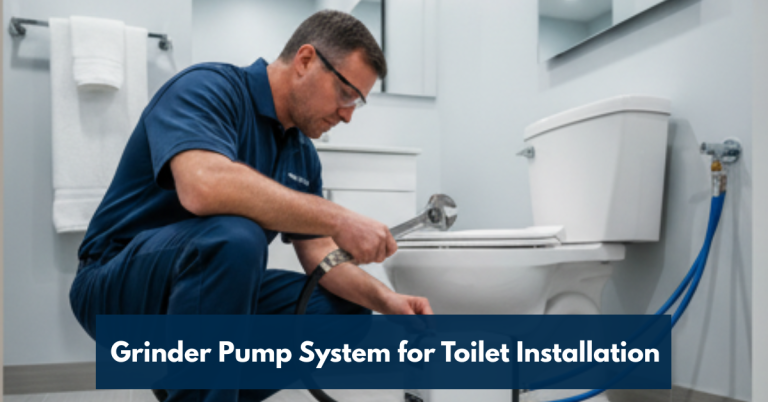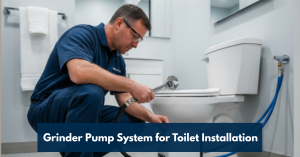When your home’s plumbing layout or elevation makes traditional gravity-based sewer systems impractical, a grinder pump system for the toilet becomes the ideal solution. Homeowners in Birmingham, MI, often face challenges with basement bathrooms, low-lying properties, or long sewer lines. In such cases, a grinder pump ensures efficient waste management by grinding and pumping wastewater uphill to the main sewer line.
If you’re considering installing a grinder pump system or want to understand how it works, this detailed guide by Whitney Services—Birmingham’s trusted plumbing experts—will walk you through everything you need to know.
What Is a Grinder Pump System for a Toilet?
A grinder pump system for toilet is a specialized plumbing component designed to handle waste and wastewater in areas where traditional gravity flow isn’t possible. It works by grinding solid waste into a fine slurry, which is then pumped through a pressure sewer line to a septic tank or municipal sewer.
Unlike standard sewage ejector pumps, a grinder pump is equipped with powerful cutting blades that shred waste efficiently, preventing clogs and ensuring smooth waste transport through smaller-diameter pipes.
Key Components of a Grinder Pump System
- Grinder Pump: The heart of the system that grinds and pumps waste.
- Holding Tank: Stores wastewater temporarily before pumping.
- Discharge Pipe: Transports the slurry to the main sewer line.
- Control Panel: Manages pump operation and alerts users of issues.
For homes in Birmingham, MI, where basements are common, these systems are a practical solution to ensure toilets function seamlessly below the main sewer level.
Why You Might Need a Grinder Pump System for Your Toilet
Many homeowners in Birmingham face elevation and drainage challenges that make a grinder pump system for a toilet a necessity rather than a luxury. Here’s why you might need one:
1. Basement or Below-Grade Bathrooms
If your bathroom is located in the basement or below the main sewer line, gravity cannot carry the waste upward. A grinder pump ensures wastewater is efficiently lifted to reach the municipal line.
2. Long-Distance Sewer Connections
Homes set far back from the main sewer line require extra pressure to move wastewater efficiently. A grinder pump provides that boost, preventing backups and blockages.
3. Low-Lying Property
If your house sits lower than the street level or the public sewer system, a grinder pump helps maintain proper waste flow.
4. Preventing Clogs and Odors
By grinding solid waste, this system minimizes the risk of pipe clogs and reduces unpleasant odors often caused by stagnant waste.
How Does a Grinder Pump System for a Toilet Work?
A grinder pump system for a toilet operates automatically whenever the toilet or any connected fixture is used. Here’s how it works step by step:
- Wastewater Collection: Wastewater from the toilet, sink, or shower flows into the holding tank.
- Grinding Process: Once the tank reaches a specific level, the grinder pump activates. The blades grind the waste into fine particles.
- Pumping Action: The slurry is then pumped under pressure through small-diameter pipes to the main sewer or septic system.
- Automatic Shutoff: After the tank is emptied, the pump shuts off automatically until the next cycle.
This process ensures consistent, efficient, and hygienic waste removal for your home.
Professional Grinder Pump System Installation in Birmingham, MI
Installing a grinder pump system for a toilet is a complex job that requires technical expertise and knowledge of local plumbing codes. That’s why Birmingham homeowners trust Whitney Services—a leading name in plumbing and drainage solutions across Michigan.
Why Choose Whitney Services for Installation?
- Licensed and Experienced Technicians: Their professionals have years of experience installing grinder pump systems for all types of homes.
- Code-Compliant Installation: Whitney Services ensures every installation meets Birmingham’s plumbing regulations.
- High-Quality Equipment: They use reliable, durable grinder pumps from top manufacturers.
- Comprehensive Service: From site inspection to maintenance, they handle everything.
Typical Installation Process
- Site Assessment: A technician inspects your plumbing layout and determines pump placement.
- Excavation and Tank Setup: A holding tank is installed in the ground or basement floor.
- Pump and Pipe Connection: The grinder pump is connected to the toilet and sewer line.
- Electrical Setup: A control panel and alarm system are installed.
- Testing and Inspection: The system is tested for leaks and operational efficiency.
With Whitney Services, you can rest assured your grinder pump system for the toilet is installed correctly and built to last.
Maintenance Tips for Grinder Pump Systems
Even though grinder pumps are designed for reliability, proper maintenance is essential to maximize their lifespan and prevent costly repairs.
1. Avoid Flushing Non-Flushable Items
Never flush items like wipes, diapers, paper towels, or feminine hygiene products—they can damage the grinder blades and clog the system.
2. Schedule Regular Inspections
Contact Whitney Services for annual system inspections to ensure everything functions optimally.
3. Keep Electrical Components Dry
Avoid water exposure to the pump’s control panel or power connections.
4. Clean the Tank Occasionally
Sediment and grease buildup can affect performance; a professional cleaning helps maintain flow efficiency.
5. Monitor the Alarm System
If the alarm sounds, it indicates a potential blockage or pump failure. Contact your technician immediately.
Regular servicing from Whitney Services keeps your grinder pump system for the toilet efficient and prevents unexpected breakdowns.
Common Signs Your Grinder Pump System Needs Repair
Homeowners in Birmingham should be alert for these signs that indicate issues with their grinder pump system:
- Slow-draining toilets or sinks
- Unusual noises from the pump unit
- Foul odors near the system
- Frequent alarm alerts
- Pump cycling too often or not turning on at all
If you notice any of these, it’s best to call Whitney Services immediately for prompt diagnostics and repair.
Cost of Installing a Grinder Pump System for Toilet in Birmingham, MI
The cost of installing a grinder pump system for a toilet in Birmingham varies based on factors like system size, brand, labor, and site conditions. On average:
- Residential installations: $2,500–$5,000
- Commercial installations: $5,000 – $10,000+
Whitney Services offers transparent pricing, free estimates, and financing options for homeowners who want reliable solutions without financial strain.
Why Birmingham Homeowners Trust Whitney Services
Whitney Services has built a strong reputation in Birmingham, MI, for their expertise, reliability, and customer-first approach. They are not just plumbers—they are problem solvers who ensure your home’s plumbing runs smoothly.
Key Advantages:
- 24/7 Emergency Services
- Certified Technicians
- 100% Customer Satisfaction Guarantee
- Locally Owned and Operated
Whether you’re upgrading your system or need a new installation, Whitney Services is the best choice for your grinder pump system for toilet needs in Birmingham, MI.
Conclusion
A grinder pump system for toilet is an excellent solution for homes with below-grade bathrooms or unique plumbing layouts in Birmingham, MI. It ensures efficient waste removal, reduces clogging risks, and offers long-term reliability.
When it comes to professional installation, Whitney Services stands out as the most trusted plumbing company in Birmingham. Their team of certified technicians delivers high-quality installation, maintenance, and repair services that keep your plumbing system running smoothly year-round.
Frequently Asked Questions
A properly maintained grinder pump system can last between 8 and 15 years, depending on usage and maintenance.
DIY installation is not recommended. These systems involve electrical wiring, plumbing connections, and city code compliance—best handled by professionals like Whitney Services.
It’s advisable to schedule professional maintenance at least once a year to ensure efficient operation and early detection of potential problems.
If the pump fails, wastewater cannot be pumped out, which can cause backups. Turn off water use and contact Whitney Services immediately for emergency repair.
Modern grinder pumps are designed for quiet operation, though you may hear a low hum during operation. Unusual noises could indicate a malfunction.







